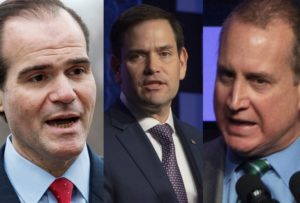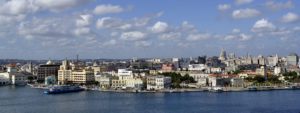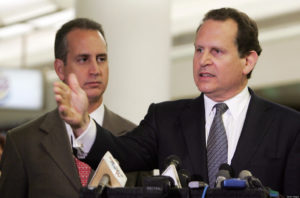 (OPINIÓN) EL REGALO DE LA ADMINISTRACIÓN TRUMP A CUBA – EL AISLAMIENTO.
(OPINIÓN) EL REGALO DE LA ADMINISTRACIÓN TRUMP A CUBA – EL AISLAMIENTO.
La administración de Trump el 17 de abril de 2019 anunció nuevas restricciones para viajar a Cuba, así como la cantidad de dinero que los cubanoamericanos pueden enviar a sus familiares en la isla.
Hubo la mala óptica de anunciar en un hotel de lujo, el Biltmore, una represión económica que seguramente perjudicará más a los pobres cubanos.
Pero la música era buena.
En el fondo, antes de los discursos, se escuchó una charanga clásica de antaño: todo el mundo con la lengua afuera, todo el mundo (cada uno saca su lengua, todos), una melodía reinterpretada por Pitbull en una canción de rap, debo agregar para las nuevas generaciones.
Había muchos políticos bobos dirigiéndose a la multitud republicana cubana.
Cuando la gente comenzó a aplaudir durante la invocación, pensé que el sacerdote los había conmovido en esta Semana Santa, pero era el gobernador Ron DeSantis el que llegaba tarde a la habitación. El senador Rick Scott envió un mensaje de video y el senador Marco Rubio regaló una bandera que había volado sobre el Capitolio.
Hubo todo eso, y más, durante el camino del asesor de seguridad nacional John Bolton a través de Miami esta semana para anunciar nuevas medidas políticas de Cuba, una ofensiva contra el gobierno cubano y el compromiso de la era de Obama.
Pero lo que no puedo sacar de mi mente es la elección de palabras del Representante de los Estados Unidos, Mario Díaz-Balart.
“El presidente Trump es un líder formidable que ha reunido un equipo formidable”, dijo. Risa, dada la puerta giratoria en la Casa Blanca y los arrestos y sentencias de los asociados del presidente.
Pero ese tipo de guataquería, de nariz parda, es de esperar. Un pomo de la puerta podría ser presidente.
Y, hubo un sonido fuerte que todo periodista está citando sobre no tener nada que temer si no está traficando con propiedades robadas en Cuba, pero sí que pagará si lo hace.
El congresista republicano se refería a lo que se considera un cambio importante en la política de Estados Unidos y Cuba: aunque tanto los gobiernos demócratas como los republicanos han rechazado abrir esta caja de Pandora, Estados Unidos ahora permitirá a los ciudadanos estadounidenses demandar a compañías extranjeras que operan en propiedades en Cuba que Fueron confiscados a ellos por el régimen cubano después de 1959.
“Si no está traficando con la propiedad robada de los estadounidenses, no tiene nada que temer”, dijo Díaz-Balart. “Pero si ha estado traficando y beneficiándose de la propiedad robada a los estadounidenses, le costará caro”.
Fue una forma pegadiza de enmarcar el desarrollo, con ese tono imperioso de Díaz-Balart que a veces me recuerda a Fidel Castro, y agradó a la audiencia de los republicanos y miembros de la Asociación de Veteranos de Bahía de Cochinos el 58 aniversario de la invasión.
Si bien los líderes y diplomáticos de Cuba están agravados, este tipo de conversación en la capital de los exiliados es música para los oídos de la dictadura.
Probablemente asustó a la muerte a todos los cubanos que viven en hogares confiscados por el gobierno de aquellos que huyeron al exilio hace décadas y los reasignaron para recompensar a los fieles a la Revolución.
Ponte en los zapatos de los cubanos comunes.
Todo fue robado: grandes granjas y pequeñas fincas, palacios y pasarelas, astilleros y molinos de azúcar, esos autos antiguos que se ven por toda La Habana, e incluso las muñecas que se exhiben en un sofá cuando los milicianos vinieron y sellaron su casa antes de irse en un Freedom. Vuelo.
Ahora Donald Trump dice que está bien demandar por las pérdidas, y su emisario es Díaz-Balart, sobrino de la primera esposa de Fidel Castro, Mirta, madre de su primer hijo, Fidelito, quien se suicidó el año pasado. Convierte a Díaz-Balart en un rival del régimen con una relación familiar complicada.
Otra de las medidas venideras, según Bolton, es que la mayoría de los viajes estadounidenses a la isla terminarán.
Entonces, ahora eres un cubano en la isla, sin estadounidenses para hablar sobre las noticias, y temiendo que te quiten la casa en la que vives. ¿Y se pregunta por qué no vemos una oposición masiva al régimen como lo hace en Venezuela?
Los cubanos temen que tengan mucho que perder con el cambio de régimen y les asusta la retórica de Díaz-Balarts de Miami.
Mario Diaz-Balart está fuera de contacto con la realidad.
También dijo que, sin su hermano ya retirado, Lincoln (que estaba en la audiencia), y la congresista Ileana Ros-Lehtinen en el Congreso para oponerse a él, “la administración anterior habría consolidado el régimen en La Habana”.
Vamos a hacer las matemáticas.
Fidel Castro y sus compañeros subieron al poder en 1959.
Eso es hace sesenta años.
El régimen consolidó el poder w-a-a-a-y-ante-Obama: los años 60, 70, 80, 90, el milenio.
En cuanto al impacto de Lincoln Díaz-Balart y Ros-Lehtinen en la administración de Obama, está bien documentado que quedaron al margen durante la apertura histórica de 2014 con Cuba. No tomes mi palabra por ello. Ambos pasaron los años de Barack Obama quejándose de ello.
Habrá mucho que escuchar sobre la política punitiva de los Estados Unidos y Cuba en los próximos días si el gobierno de Trump cumple con su declaración de librar una guerra económica para obligar a Cuba a dejar de ayudar a los regímenes represivos de Venezuela y Nicaragua a mantenerse a flote.
O tal vez no.
Tal vez los discursos fueron solo otra ronda de aire caliente político para el beneficio del cubano Miami a la luz de las elecciones presidenciales de 2020.
O tal vez sea ambos.
No se puede negar que el régimen cubano es un mal actor en el hemisferio y tiene una larga historia de represión de su gente y de la violación de los derechos humanos básicos.
Pero el regalo del presidente Trump al gobierno cubano es un retorno al conflicto y el aislamiento de lo que fue una fuerza modernizadora que cambió la isla: la influencia estadounidense.
AUTORA:  FABIOLA SANTIAGO. La galardonada columnista Fabiola Santiago ha escrito sobre todo Miami desde 1980, cuando el elevador de barcos de Mariel se convirtió en su primera historia de primera página. Refugiada cubana, hija de Freedom Flight, también es autora de ensayos, relatos breves y de la novela “Reclamando París”.
FABIOLA SANTIAGO. La galardonada columnista Fabiola Santiago ha escrito sobre todo Miami desde 1980, cuando el elevador de barcos de Mariel se convirtió en su primera historia de primera página. Refugiada cubana, hija de Freedom Flight, también es autora de ensayos, relatos breves y de la novela “Reclamando París”.
 (OPINION) TRUMP ADMINISTRATION GIFT TO CUBA -ISOLATION.
(OPINION) TRUMP ADMINISTRATION GIFT TO CUBA -ISOLATION.
The Trump administration on April 17, 2019 announced new restrictions on travel to Cuba as well as the amount of money Cuban Americans can send to relatives on the island.
There were the bad optics of announcing at a posh hotel, the Biltmore, an economic crackdown that will surely hurt poor Cuban people the most.
But the music was good.
In the background, before the speeches, a classical charanga from yesteryear played: todo el mundo con la lengua afuera, todo el mundo (every one stick your tongue out, everyone), a tune reinterpreted by Pitbull in a rap song, I should add for the new generations.
There were lots of bobble-headed politicians playing to the Republican Cuban crowd.
When people began applauding during the invocation, I thought they were moved by the priest on this, Holy Week, but it was Gov. Ron DeSantis walking into the room late. Sen. Rick Scott sent a video message and Sen. Marco Rubio gifted a flag that had flown over the Capitol.
There was all that – and more – during national security adviser John Bolton’s path through Miami this week to announce new Cuba policy measures, a crackdown on both the Cuban government and Obama-era engagement.
But what I can’t get out of my mind is U.S. Rep. Mario Diaz-Balart’s choice of words.
“President Trump is a formidable leader who has assembled a formidable team,” he said. Laughable, given the revolving door at the White House and the arrests and jail sentences of the president’s associates.
But that kind of guataquería, brown-nosing, is to be expected. A doorknob could be president.
And, there was the sound bite every journalist is quoting about having nothing to fear if you’re not trafficking in stolen property in Cuba, but hell to pay if you do.
The Republican congressman was referring to what’s being hailed as a major shift in U.S.-Cuba policy: Although both Democratic and Republican administrations have rejected opening this Pandora’s box, the United States will now allow American citizens to sue foreign companies operating on properties in Cuba that were confiscated from them by the Cuban regime after 1959.
“If you are not trafficking with the stolen property of Americans you have nothing to fear,” Diaz-Balart said. “But if you have been trafficking and benefiting from property stolen from Americans, it will cost you dearly.”
It was a catchy way of framing the development – with that imperious Diaz-Balart tone that sometimes reminds me of Fidel Castro – and it pleased the audience of Republicans and Bay of Pigs Veterans Association members marking the 58th anniversary of the invasion.
Although Cuba’s leaders and diplomats are acting aggrieved, this kind of talk in the capital of exiles is music to the dictatorship’s ears.
It probably scared to death all the Cuban people who live in homes confiscated by the government from those who fled to exile decades ago and re-assigned to reward the faithful to the Revolution.
Put yourself in the shoes of ordinary Cubans.
Everything was stolen – large farmsteads and little fincas, palaces and walkups, shipyards and sugar mills, those vintage cars you see all over Havana, and even the dolls displayed on a sofa when the milicianos came and sealed your house before you left on a Freedom Flight.
Now Donald Trump says it’s okay to sue for losses – and his emissary is a Diaz-Balart, nephew of Fidel Castro’s first wife, Mirta, mother of his first son, Fidelito, who committed suicide last year. It makes Diaz-Balart an archrival of the regime with a complicated family relation.
Another of the coming measures, Bolton, said is that most American travel to the island will end.
So, now you’re a Cuban on the island, with no Americans to chat up about news, and fearing that the home you live in will be taken from you. And you wonder why we don’t see massive opposition to the regime the way you do in Venezuela?
Cubans fear that they have a lot to lose with regime change and they’re scared of the rhetoric of the Diaz-Balarts of Miami.
Mario Diaz-Balart is out of touch with reality.
He also said that, without his now retired brother, Lincoln (who was in the audience), and congresswoman Ileana Ros-Lehtinen in Congress to oppose him, “the previous administration would have consolidated the regime in Havana.”
Fidel Castro and his cohorts rose to power in 1959.
That’s sixty years ago.
The regime consolidated power w-a-a-a-y before Obama: the 60s, the 70s, the 80s, 90s, the millennium!
As for Lincoln Diaz-Balart and Ros-Lehtinen’s impact on the Obama administration, it has been well documented that they were sidelined during the historic 2014 opening with Cuba. Don’t take my word for it. They both spent the Barack Obama years complaining about it.
There will be much to hear about the punitive U.S.-Cuba policy in the coming days if the Trump administration makes good on its declaration of waging an economic war to force Cuba to stop helping Venezuela and Nicaragua’s repressive regimes stay afloat.
Or, maybe not.
Maybe the speeches were just another round of political hot air for Cuban Miami’s benefit in light of the 2020 presidential elections.
Or maybe it’s both.
There’s no denying that the Cuban regime is a bad actor in the hemisphere and has a long history of repressing its people and violating basic human rights.
But President Trump’s gift to the Cuban government is a return to conflict and isolation from what was a modernizing force changing the island: American influence.
AUTHOR:  FABIOLA SANTIAGO. Award-winning columnist Fabiola Santiago has been writing about all things Miami since 1980, when the Mariel boatlift became her first front-page story. A Cuban refugee child of the Freedom Flights, she’s also the author of essays, short fiction, and the novel “Reclaiming Paris.”
FABIOLA SANTIAGO. Award-winning columnist Fabiola Santiago has been writing about all things Miami since 1980, when the Mariel boatlift became her first front-page story. A Cuban refugee child of the Freedom Flights, she’s also the author of essays, short fiction, and the novel “Reclaiming Paris.”
Agencies/ TheHerald/ Fabiola Santiago/ Internet Photos/ Arnoldo Varona/ www.TheCubanhistory.com
THE CUBAN HISTORY, HOLLYWOOD.



 < (OPINION) Trump Administration Gift to Cuba - ISOLATION.
< (OPINION) Trump Administration Gift to Cuba - ISOLATION.








